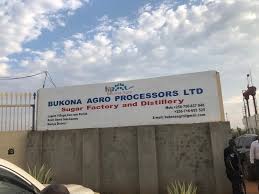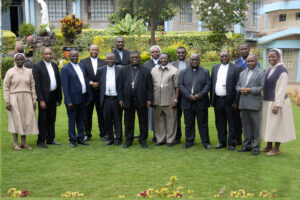UGANDA: Archdiocese of Gulu Focuses on Empowering Farmers Through Multi-Sectoral Programs

Bukona Agro Processor Limited in Nwoya district-courtesy photo
Isaack Ojok
The Archdiocese of Gulu is working with partners to promote multi-sectoral development in northern Uganda at the time when it is in the process of recovery from the adverse effects of the Lord’s Resistance Army -LRA insurgency.
The multi-sectoral programs are concurrently being initiated and implemented under the Cassava Commercialization and Industrialization program in Gulu Archdiocese.
According to Fr Matthew Okun Lagoro, the main aim of the programs is to enable farmers in the region progress to the middle-income status economy. He further said, the programs are as well given to prepare and empower farmers in the region to compete for development.
Among the partners, is Bukona Agro-Processors Limited located in Koch Goma sub-county, Nwoya District, an enterprise with circles of industrial unit buying dry cassava from farmers to empower and boost their household income. Out of the dry Cassava, the factory is set to operationalize ethanol from cassava with approximately 40,500 litres of denatured alcohol for cooking and lighting purposes.
This is observed to contribute to environmental protection through reduced deforestation and saving up to around 1,270 trees per year as a result of a nationwide gradual shift from the usage of fossil fuels, firewood and charcoal to ethanol cook stoves.
Apart from Bukona Agro Processors Limited, the Archdiocese is taking steps to establish another Cassava factory after a successful feasibility study conducted by technical team of experts.
In an interview with AMECEA Correspondent, Fr Okun confirmed that the construction of new cassava factory will be financed by Uganda Development Cooperation with the aim to increase industrialization of the region and boost production of cassava and its by-products in the region.
In line with the ongoing investment partnership engagements, Fr Okun observed that the factory when constructed, will provide employment opportunities to the local populace both directly and indirectly associated with the industrialization of the cassava crop into denatured ethanol giving examples of farmers, factory workers, packaging, transportation and distribution channels among others.
With cooperation from the lead farmers, Fr Okun Matthew revealed that they have also incorporated the Micro-Finance Uganda Chapter on purpose to strengthen the capacity of farmers in terms of access to other financial schemes so to fight house hold poverty and stimulate development of their households and the localities.
Similarly, he said the Archdiocese is also working in collaboration with other government programs like National Agricultural Advisory Services –NAADS, Operation Wealth Creation-OWP, the programs aiding the distribution and supply of farm materials, creating links and avenues for farmers to access markets for their products.
Fr Okun also informed AMECEA correspondent that recently, the Archdiocese signed a Memorandum of Understanding (MOU) with Mount Meru Company Limited in Lira, a firm with similar vision working to promote Agricultural production and to create wider markets for farm products.

Although the programs for development are progressing swiftly, he said there is need to sensitize the public in the region to embrace the programs and other upcoming initiatives in a move for them remain self-reliant.
He went on to share that they plan to extend similar initiative to other dioceses under Gulu Ecclesiastical province.
In the face of diverging opinions, queries and suspicions from the critics about the programs, Fr Okun Matthew is optimistic that the move will speed up the process of recovery from the adverse effects of the insurgency in Northern Uganda.
As spiritual leaders, he said, they are committed to guide people to work to transform their lives and then challenged stakeholders in the region to play their role in guiding the local population in a bid to promote and strengthen economic empowerment.
For future sustainability of the program, the coordinator disclosed that discussions are ongoing with responsible authorities and other section of stakeholders for the region to progress successfully.
End


